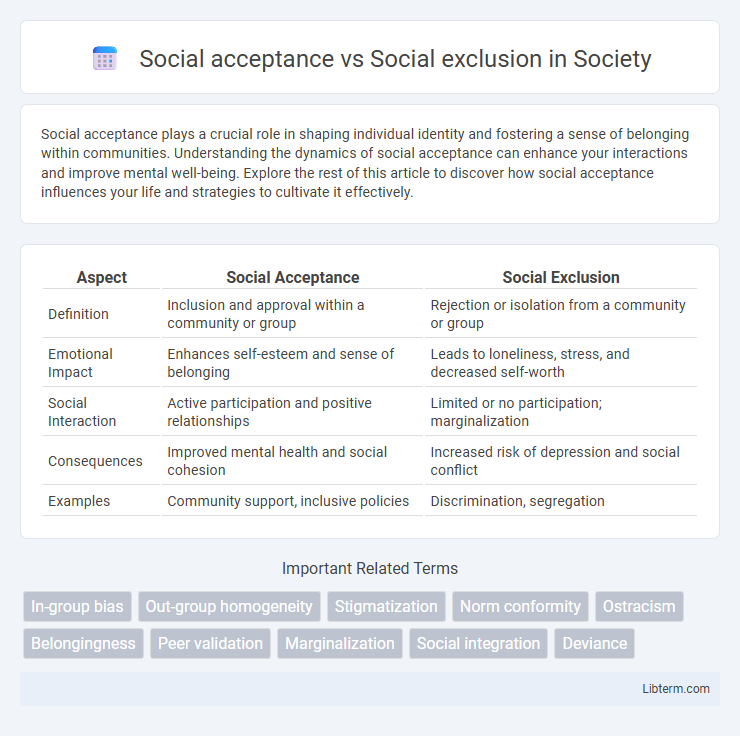Social acceptance plays a crucial role in shaping individual identity and fostering a sense of belonging within communities. Understanding the dynamics of social acceptance can enhance your interactions and improve mental well-being. Explore the rest of this article to discover how social acceptance influences your life and strategies to cultivate it effectively.
Table of Comparison
| Aspect | Social Acceptance | Social Exclusion |
|---|---|---|
| Definition | Inclusion and approval within a community or group | Rejection or isolation from a community or group |
| Emotional Impact | Enhances self-esteem and sense of belonging | Leads to loneliness, stress, and decreased self-worth |
| Social Interaction | Active participation and positive relationships | Limited or no participation; marginalization |
| Consequences | Improved mental health and social cohesion | Increased risk of depression and social conflict |
| Examples | Community support, inclusive policies | Discrimination, segregation |
Understanding Social Acceptance
Social acceptance involves recognizing and valuing individuals within a community, fostering a sense of belonging and psychological well-being. Understanding social acceptance requires examining the roles of empathy, conformity, and social norms in facilitating inclusion and positive interpersonal relationships. High levels of social acceptance correlate with reduced stress and enhanced mental health, highlighting its importance in social dynamics.
Defining Social Exclusion
Social exclusion refers to the process by which individuals or groups are systematically blocked from accessing rights, opportunities, and resources that are normally available to members of society, such as education, employment, healthcare, and social participation. This phenomenon results in social isolation, economic disadvantage, and reduced life chances, affecting marginalized populations including ethnic minorities, people with disabilities, and low-income communities. Understanding social exclusion is crucial for developing policies that foster social inclusion and equitable opportunities for all members of society.
Psychological Impacts of Social Acceptance
Social acceptance significantly enhances psychological well-being by fostering a sense of belonging, self-esteem, and emotional security. Positive social interactions activate neural reward pathways, reducing stress and promoting mental health resilience. Conversely, social exclusion triggers feelings of loneliness, anxiety, and depression, highlighting the critical role of acceptance in cognitive and emotional regulation.
Consequences of Social Exclusion
Social exclusion leads to significant psychological consequences such as increased feelings of loneliness, depression, and anxiety. It negatively impacts physical health by elevating stress levels and weakening the immune system, which may result in chronic conditions like cardiovascular disease. Long-term social exclusion also impairs cognitive function and reduces opportunities for economic advancement and social mobility.
Factors Influencing Social Acceptance
Factors influencing social acceptance include shared values, effective communication, and conformity to group norms, which foster inclusion and positive relationships. Emotional intelligence and empathy enhance understanding and cohesion among individuals, promoting acceptance within communities. Social identity, cultural background, and perceived similarity also play critical roles in determining whether individuals are embraced or face social exclusion.
Causes of Social Exclusion
Social exclusion stems from factors such as systemic discrimination, poverty, and lack of access to education and employment opportunities, which marginalize individuals or groups from mainstream society. Social stigmatization, cultural barriers, and political instability further intensify exclusion by limiting participation in social, economic, and political activities. These causes generate inequality, hinder social cohesion, and perpetuate cycles of disadvantage and isolation.
The Role of Culture in Social Dynamics
Cultural norms and values significantly shape social acceptance and social exclusion by defining acceptable behaviors and group membership criteria within communities. In collectivist cultures, social harmony and group cohesion emphasize inclusion, whereas individualist cultures may prioritize personal achievement, sometimes leading to exclusion of those who do not conform to societal expectations. Understanding cultural influences on social dynamics is essential for addressing social exclusion and promoting inclusive environments.
Social Acceptance in Digital Communities
Social acceptance in digital communities fosters user engagement, promotes inclusivity, and enhances emotional well-being by creating environments where individuals feel valued and respected. Positive social interactions and supportive feedback increase a sense of belonging, encouraging active participation and collaboration across diverse online platforms. Algorithms emphasizing constructive content further reinforce acceptance by reducing toxicity and promoting respectful discourse.
Overcoming Social Exclusion
Overcoming social exclusion requires targeted community programs that foster inclusion and promote equal opportunities in education, employment, and social participation. Developing strong social networks and accessible support services enhances individuals' sense of belonging and reduces isolation. Policies that address systemic barriers and encourage diversity can significantly improve social acceptance and integration.
Building Inclusive Societies
Building inclusive societies requires fostering social acceptance by promoting diversity, equity, and mutual respect among individuals regardless of their backgrounds or identities. Social exclusion undermines community cohesion and perpetuates inequality by marginalizing groups based on race, ethnicity, gender, or socioeconomic status. Implementing inclusive policies, education, and community engagement initiatives enhances social integration and reduces disparities.
Social acceptance Infographic

 libterm.com
libterm.com